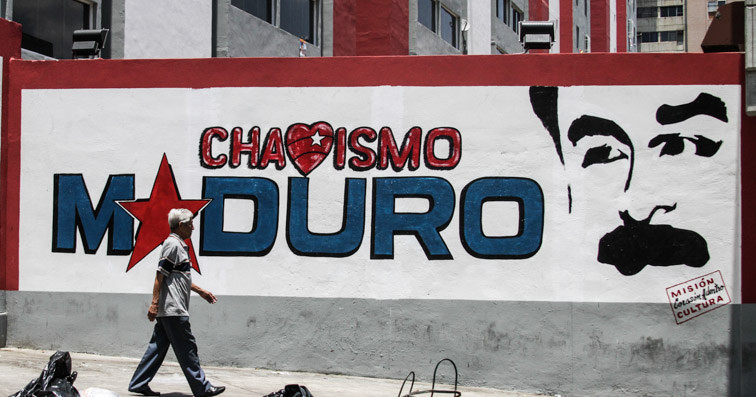Like this article? rabble is reader-supported journalism. Chip in to keep stories like these coming.
Concerns about a U.S.-backed coup plot have surfaced once more in Venezuela.
Last Friday, President Nicolás Maduro extended a state of emergency and accused the U.S. government of planning a coup. On Tuesday, opposition leader Henrique Capriles reportedly urged the public to defy the emergency degree, which broadens police and military powers, and said that the army must decide whether it is “with the constitution or with Maduro.” The same day, Maduro said that the U.S. had violated its airspace twice last week.
In 2002, the U.S. welcomed a coup attempt that successfully deposed Hugo Chávez for 48 hours. There have been reports that the U.S. either gave their tacit approval to the coup’s participants, directly assisted it, or at least had prior knowledge that it did not share with Venezuela.
On Wednesday, Maduro expressed that South America’s right wing is “generating chaos” in order to set the stage for foreign intervention by the U.S., teleSUR reported. Recently, President Dilma Rouseff of Brazil was suspended and the region has seen a partial rollback of social democratic “Pink Tide” governments. On Tuesday, Noam Chomsky said that Rousseff had effectively been “impeached by a gang of thieves.”
Gabriel Hetland, a specialist in Latin American politics at University at Albany, SUNY, when asked about comparisons with Brazil, explained that groups in both countries that lost power during Pink Tide governments are trying to re-assert influence.
“I think throughout Latin America and certainly in Brazil and Venezuela elites and the political class that was displaced by Maduro, Chavez, Lula and Rousseff have been resentful of the empowerment of the popular classes, resentful of having to share the nation’s wealth with ordinary citizens,” Hetland told rabble.ca in a phone interview on Tuesday. “And therefore, because of that, they’ve been taking action for years to try to remove leaders from office.”
In the past, Canada has also been accused of involvement in plans to undermine Venezuela. Then-president of Venezuela’s national assembly, Diosdado Cabello, identified a specific RCMP officer as being involved in coup plans in February 2015.
George Ciccariello-Maher, a political scientist at Drexel University who speaks frequently on Venezuelan politics, told rabble.ca that a coup attempt is a real possibility.
“This has not always been the case. For many years the opposition considered a coup to be a bad idea, since their 2002 coup failed and left them politically defeated,” Ciccariello-Maher wrote in an email on Wednesday. “But in the next few months, a coup attempt or something of the sort is very possible.”
“Even mainstream opposition figures are speaking openly of supporting a coup, as when Capriles recently spoke of the military needing to make a decision soon,” Ciccariello-Maher wrote. “The opposition is worried that if they don’t overthrow Maduro now, they will lose their chance if things improve.”
An individual who works with Venezuela’s American embassy on media relations had sought a response for rabble.ca on the coup plot allegations but none was received by publication time.
Economic problems
Currently, Venezuela also faces serious economic problems, especially shortages of imported consumer goods. Lower oil prices have severely hurt government revenues — oil constituted 94 per cent of exports in 2014, for example, according to data from the Harvard Atlas of Economic Complexity.
Naomi Schiller, an anthropologist at Brooklyn College, CUNY who studies Venezuela, explained that, “everyday tasks like grocery shopping, dental work or getting to school have become onerous for ordinary Venezuelans,” adding that hostility and opportunism from Venezuela’s private sector have contributed to shortages, speculation and hoarding, problems exacerbated, she said, by government mismanagement.
“Many are seeing the gains they made in access to food, housing, and healthcare during the Chávez years wiped away,” Schiller continued in a statement provided to rabble.ca on Wednesday. “The private sector, many in the opposition, and some in the government want to pave the road to recovery on the backs of the poorest.”
Gabriel Hetland also told rabble.ca about economic conditions that have been reported in Venezuela.
“The situation in Venezuela seems to be quite, quite difficult….As far as I understand it there’s tremendous shortages, lines. A severe drought is affecting the country right now, making things much worse,” Hetland said in a voicemail left prior to his interview with rabble.
Hetland, Ciccariello-Maher and Schiller, as well as political analyst Keane Bhatt, all identified problems with the government’s current exchange rate policy or system of currency controls.
Media picture: U.S. “sees” risk of coup
International and corporate media coverage of Venezuela has often been contentious.
In a piece titled, “Don’t Believe Media Coverage of Venezuela,” for example, Pacifica’s Sonali Kolhatkar opined that much Western media extends automatic sympathy to right-wing protestors and denigrates the Bolivarian social movement.
Keane Bhatt told rabble.ca that the international media has been predictably one-sided. rabble.ca also asked Bhatt about the possible functions of media reports on a coup in Venezuela.
“The real question that we should be pressing state department officials to say is whether the coup would be a good or bad thing,” Bhatt said in a Skype call on Wednesday. “Anonymous officials speculating about a coup can reasonably be understood by people as a form of encouragement of a coup.”
“It’s very important to recognize that there is a standard playbook when it comes to fomenting and executing and ensuring the success of coups, particularly in Venezuela. The first issue begins with the kind of media drumbeat where anonymous U.S. officials ‘warn’ of, in non-specific terms, general malaise that may turn into a political uprising or defections within the military.
“Right now, what we’re seeing from both the U.S. and international press is exactly this.”
Cory Collins is a writer and visual artist living in St. John’s. He can be contacted via Twitter @coryGcollins or corycollins.ca.
Image: Flickr/Joka Madruga



